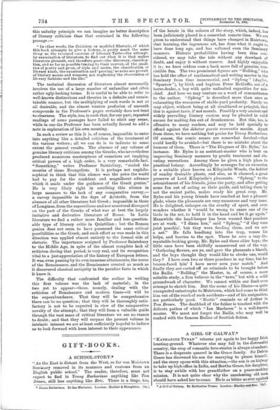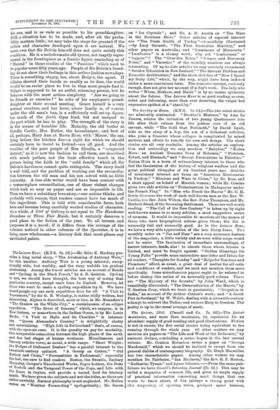A GIRL OF GALWAY.*
" KATHARINE TYNAN " returns yet again to her happy Irish hunting-ground. Whatever else may fail in the distressful country, the crop of romantic love-stories is always abundant. There is a desperate quarrel in the Grace family. Sir Delvin Grace has disowned his son for marrying to please himself, and the story opens with this situation,—the son is on his:way to take up high office in India, and Bertha Grace, his daughter, is to stay awhile with her grandfather on a peace-making mission. It is not quite clear why the unrelenting old man should have asked her to come. He is as bitter as ever against al Girl of Galway. By Katharine Tynan. London : Macke and Son. 160 hie eon, and is as rude as possible to his granddaughter. Still, a situation has to be made, and, after all, the proba- bility matters little; we may take the stage for granted if the action and character developed upon it are natural. We must own that Sir Delvin himself does not quite satisfy this condition. He is a melodramatic old tyrant, not inaptly repre- sented in the frontispiece as a frantic figure, reminding us of Hatred" in those studies of the " Passions " which used to be popular some fifty years ago. People of Sir Delvin's breed- ing do not show their feelings in this artless fashion nowadays. There is something stagey, too, about Bulger, the agent. If villains showed their hands so readily as he does, the world would be an easier place to live in than most people find it. Bulger is supposed to be an artful, scheming person, but he behaves with the most artless simplicity. " Are we going to be friends or enemies P" he asks of his employer's grand- daughter at their second meeting. Grace herself is a very natural creature, and her lover, whose family is, of course, under the old man's ban, is a sufficiently well set-up figure, too much of the fortis Gyas kind, but not unequal to the part which he has to play. The strength of the story is in the scenes of humbler life. Malachy, the old butler at Corofin Castle ; Mrs. Butler, the housekeeper ; and best of all, perhaps, Mary Ann at Hawn. Rose, with ' Mouse,' the ass, lying before the kitchen fire—a sight for which we should certainly have to travel to Ireland—are all good. And the troubles of the poor people of Ben Sheelin, a " congested district," as it is now the fashion to call them, are described with much pathos, not the least effective touch in the picture being the faith in the " onld family" which all Sir Delvin's harshness cannot quite extinguish. The story itself is well told, and the problem of working out the reconcilia- tion between the old man and his son solved with no little ingenuity. A less able writer would have been content with a commonplace reconciliation, one of those violent changes which look so easy on paper and are so impossible in life. Then we have a subsidiary love-story,--our author thinks, and probably with reason, that readers cannot have too much of this ingredient. This is told with considerable force, both hero and heroine being carefully worked studies of character. As a whole, A Girl of Galway is not equal to The Handsome Brandons or Three Fair Maids, but it certainly deserves a good place in the fiction of the year. To all intents and purposes it is a novel; if it differs from the average of the volumes noticed in other columns of the Spectator, it is in being more wholesome,—a literary dish that must please any =vitiated palate.



























































 Previous page
Previous page